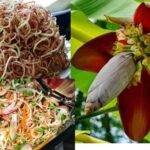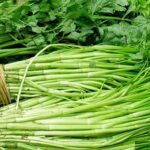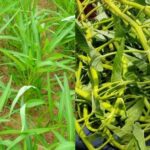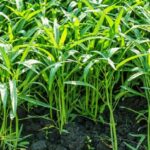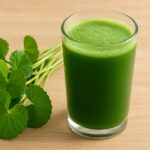In Vietnam, there are three types of vegetables that are renowned for their nutritional benefits and positive effects on longevity, earning them the title of “longevity vegetables.” These vegetables are easily accessible and affordable, commonly found in local markets.
1. Amaranth
Amaranth, or rau dền in Vietnamese, is a popular vegetable in Vietnam that is not only easy to cultivate but also packed with nutritional value. According to herbalist Bùi Đắc Sáng from the Vietnam Academy of Science and Technology and Hanoi Oriental Medicine Association, amaranth has a high iron content, which aids in increasing hemoglobin and red blood cell production, making it beneficial for those suffering from anemia.
Additionally, amaranth is an effective companion for diabetics due to its abundant fiber content, which helps regulate blood sugar levels and prevent complications. This vegetable is also rich in protein and magnesium, both of which play a role in insulin regulation, reducing hunger cravings, and supporting weight control.
Amaranth is excellent for bone health as well. A 100g serving of amaranth provides approximately 267mg of calcium, meeting up to 50% of the daily calcium requirement. This helps prevent osteoporosis, joint pain, and other issues arising from calcium deficiency.
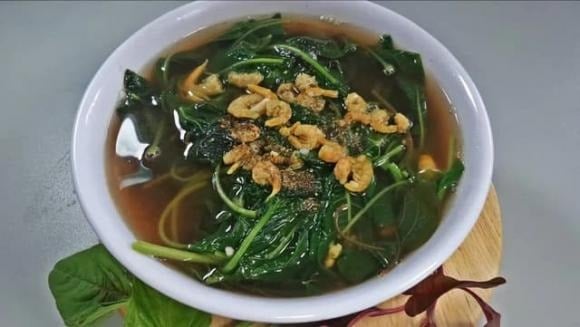
2. Basella Alba
Basella Alba, or rau mồng tơi, is a familiar dish on Vietnamese dinner tables and boasts a high nutritional value. According to modern medicine, this vegetable is rich in essential minerals, with a selenium content 30 times higher than that of onions, boosting immunity and aiding in blood enrichment.
Basella Alba is also considered a “longevity vegetable” due to its ability to prevent and support the treatment of various diseases such as diabetes, constipation, and cancer. With an iron content of approximately 15% of the daily requirement, Basella Alba is effective in improving anemia.
Notably, this vegetable helps regulate blood sugar levels due to its high fiber content, which slows down the absorption of sugar after meals. Additionally, Basella Alba contains abundant vitamins C and K, which support the pancreas’s function and effectively regulate insulin.
Apart from its blood sugar-lowering properties, Basella Alba also contributes to strong bones thanks to its rich iron and calcium content, making it suitable for the elderly to prevent osteoporosis and bone and joint pain. When combined with other nutritious foods, Basella Alba is an excellent choice for comprehensive health improvement.
3. Water Spinach
Water spinach, or rau muống, is one of the most familiar and popular vegetables in the daily diet of Vietnamese people. With its low cost and versatility in cooking, whether boiled, stir-fried, or made into soup, water spinach is not only delicious but also highly beneficial to health.
This vegetable is rich in iron, helping to prevent anemia, especially in women and the elderly. Additionally, 100g of water spinach contains approximately 77mg of calcium, a crucial mineral for increasing bone density and preventing osteoporosis and age-related joint pain.
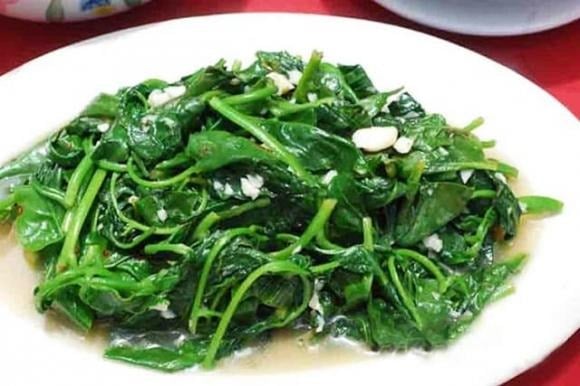
Notably, water spinach is diabetic-friendly due to its high fiber content, which slows down sugar absorption after meals, thereby maintaining stable blood sugar levels. It also contains natural nitrates, compounds known for their ability to effectively lower blood sugar and improve cardiovascular health.
With these benefits, water spinach is undoubtedly one of the most affordable and accessible “longevity vegetables” that deserves a regular spot in every family’s menu.
3 Popular Vegetables Loved by the Vietnamese but Prone to ‘Parasitic’ Contamination, with the Top Contender Posing a Serious Threat
“Aquatic vegetables are a nutrient-rich source of food, however, when grown in contaminated water, they can become a breeding ground for parasites and worms. It is imperative to ensure the water quality is pristine to avoid any potential health hazards that may arise from consuming these vegetables.”
4 Natural Detoxifying Vegetables for a Healthy Liver: A Family Affair
The liver is the body’s “detoxification factory”, but it is vulnerable to the onslaught of dietary habits, stress, and environmental pollution. Fortunately, there are common, easily accessible vegetables that can be incorporated into your daily meals to give your liver a helping hand. These vegetables provide a natural boost to the liver’s detoxification process, ensuring a healthier you without the need for medication.
























